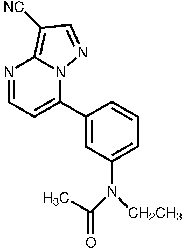| iPsychology
|
|
Sonata ( Zaleplon ) Sonata ( Zaleplon ) is a nonbenzodiazepine hypnotic. Sonata ( Zaleplon ) is used to treat short-term difficulty in falling asleep. Sonata ( Zaleplon ) has been shown to decrease the time to sleep onset for up to 28 days in clinical studies. Sonata ( Zaleplon ) has not been shown to increase your total sleep time or decrease the number of times you wake up after falling asleep. In general, medications used to bring on sleep should only be used for 7- 10 days.
Strengths:
Dosages: Actual dosage must be determined by a physician. Normal dosage: Adult 10 mg at bedtime. 65 years and older 5 mg at bedtime. Problems with: Test: Take With: A full glass of water. Do not take this medicine when your schedule does not permit you to get at least 4 hours of sleep. If you must wake up before this, you may continue to feel drowsy and may experience memory problems, because the effects of the medicine have not had time to wear off. Full Benefits In: 1 to 2 days. Missed Dose(s): If you miss a dose of this medicine, skip the missed dose and go back to your regular dosing schedule. Never Take a Double Dose If Stop Taking: Do not stop without consulting your physician and never abruptly. If you abruptly stop taking Sonata you may experience withdrawal symptoms. Overdose symptoms include: clumsiness or unsteadiness, confusion, severe drowsiness, low blood pressure, unusual dullness or feeling sluggish, and troubled breathing. Can be fatal. Warnings Avoid alcohol while taking this drug. The habit-forming potential is high. There is a risk of becoming dependent on Sonata, as with any sleeping medication. However, if you have a history of addiction to alcohol or drugs your risk of your becoming dependent on Sonata is higher. Be sure to tell your doctor about any previous addictions to alcohol or drugs before you start taking Sonata. Do not take this drug if you are pregnant. ( Only take if the mother's or baby's life is endangered ) Do not take this drug if planning to become pregnant. Do not take if you are breast-feeding. Withdrawal symptoms may occur when sleep medicines are stopped suddenly after being used daily for a long time. In some cases, withdrawal symptoms may include unpleasant feelings. In severe cases, stomach and muscle cramps, vomiting, sweating, shakiness, and rarely seizures may occur. These more severe withdrawal symptoms are very uncommon. Although withdrawal symptoms have not been observed in studies of Sonata so far, there is, nevertheless, the risk of such events in association with the use of any sleep medicines. There is a chance that you may experience a certain type of memory loss (amnesia). This can usually be avoided by taking Sonata only when you are able to get 4 or more hours of sleep before you need to be active again. If you do have memory problems while taking Sonata, tell your doctor. Do not use if: You had negative reactions to this drug or any other phenothiazine in the past. Inform your Doctor if:
Sonata ( Symptoms or Effects ) Common: headache, drowsiness, dizziness, amnesia, stomach ache, and muscle pain. Less Common: Abdominal pain, burning, prickling, or tingling sensation, constipation, cough, difficulty concentrating, drowsiness, dryness of mouth, excess muscle tone, eye pain, fever, heartburn, indigestion, or acid stomach, itching, itching or burning eyes, joint stiffness and/or pain, memory loss, menstrual pain, mental depression, nervousness, sensitive hearing, severe headache, shortness of breath, skin rash, tightness in chest, trembling or shaking, troubled breathing, unusual weakness or tiredness, and / or wheezing. Rare: nosebleeds, hallucinations ( seeing, hearing, or feeling things that are not really there ). See physician NOW: confusion, difficulty breathing, hallucinations ( seeing, hearing, or feeling things that are not really there ), hostility, restlessness, excitability, lightheadedness or fainting spells, mental depression or worsening of depression, slurred speech, unusual weakness, staggering, tremors, suicidal thoughts and / or vision problems. Sonata ( zaleplon ) Interactions
|

